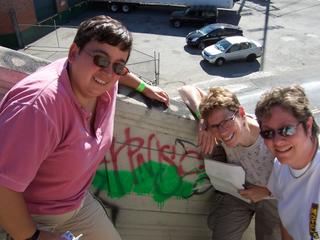 I dragged Dena & Arlene to an outdoor showing of the cult classic Repo Man sponsored by the Alamo Roadshow. None of us had ever done a road rally and though there were a few testy moments we did have fun. We were first to the first clue, which was a tire/muffler place on Mission Street in downtown Los Angeles.
I dragged Dena & Arlene to an outdoor showing of the cult classic Repo Man sponsored by the Alamo Roadshow. None of us had ever done a road rally and though there were a few testy moments we did have fun. We were first to the first clue, which was a tire/muffler place on Mission Street in downtown Los Angeles.Highlights to the day include going down a tunnel to the LA River and meeting the neighborhood homeless speed freak who was extensively tattooed; Dawn doing a face plant while running across the 4th Street Bridge/street, probably the highlight there is that I didn't get run over by a semi truck while sprawled across the white lines.
We had a major breakdown following my kareoke stint at the Japanese Village. I suppose I should explain that. One of us had to sing "punk rock style" to Little deuce Coupe. I was elected, now I have to tell you, it's not fair that she made me start the song in the middle. Arlene said I totally didn't do it punk rock style, I did it with my hips swaying 50's style. What can I tell you. Anyways, the clue was "if G Money and Les Nessman owned a convenience store, what would it be called? The store is East of one of the bridges." Well you could say we got off on a wrong tangent thinking WKRP in Cincinnati, I took the van up to Mission when all along the store was off the 4th street bridge. There's no bridge on Mission. This is where things got testy. It was hot, we were tired and ready for a cold one. We had to call in and get a clue, which was basically that the damn store was called "GLess Meat Market" Who was going to guess that??

